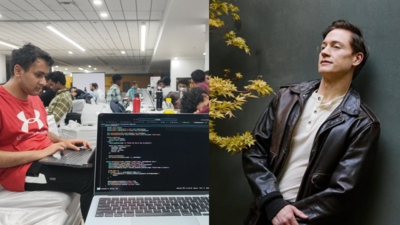
credit: (Instagram/@bryanjohnson_ & X/@priyanshu.sol)
A social media post shared by Indian web developer Priyanshu Tiwari surfaced, igniting a global conversation about work culture and health. Priyanshu shared a photo of himself and his colleagues working in an office, coding till 4 am, captioned, “It is 4 am, guys, but builders are building.
What’s your excuse?” This post instantly went viral, gaining praise for the team’s dedication.American entrepreneur and venture capitalist Bryan Johnson, who is also an anti-aging advocate, responded with a cautionary note, saying that such work habits are “terrible for health” and should not be seen as “heroic.” He further went on to highlight the adverse effects of prolonged screen time and poor posture, including reduced brain oxygen, suppressed melatonin production, fragmented sleep patterns, and whatnot.
The digital divide: Health versus hustle
Johnson's candid comments evoked both admiration and criticism. His supporters praised him for speaking out about what they perceive as a poisonous work environment that MNCs and high-tech firms have glamorized. A user said, "Bryan is spot on." This kind of schedule is not sustainable.”However, detractors accused Johnson of being out of touch with the struggles of young professionals who may not have the luxury to prioritize culture over work and sleep deadlines. Another user on X commented, “Easy to give this advice from your villa in Venice when you've already made millions,” pointing out the disparity in lived experiencesTo which Bryan responded calmly, “Even small improvements in sleep posture and circadian rhythm can enhance performance and longevity.
It’s not either-or.”
The silent killer: Chronic stress and posture

Experts are increasingly arguing that poor posture on the job, particularly while working long hours in front of computer screens, has long-term effects. Slumping, leaning forward in the neck, or even typing in poorly arranged workspaces can cause:Musculoskeletal disorders like chronic neck, back, and shoulder painPoor circulation, which raises the danger of varicose veins and blood clotsSpinal misalignment that causes long-term orthopedic problemsRespiratory restriction, since slumped posture can compress the lungsMental exhaustion, as a result of oxygen decline from shallow breathingA 2021 report by WHO indicated that prolonged working hours led to 745,000 deaths worldwide due to heart disease and stroke, especially.
The study concludes that working 55 or more hours per week is associated with an estimated 35% higher risk of a stroke and a 17% higher risk of dying from ischemic heart disease, compared to working 35-40 hours a week.Further, the number of people working long hours is increasing and currently stands at 9% of the total population globally. This trend puts even more people at risk of work-related disability and early death.This exchange has highlighted a growing concern in the tech industry: the pressure to reach targets and work for longer hours, and the romanticization of burnout. This glorification can come at a higher cost than expected.
Does this mean more working hours for the upcoming generation?
Priyanshu Tiwari’s post was undoubtedly meant to inspire. In many ways, it reflects the dedication of a generation willing to push boundaries for success. But Johnson’s critique introduces an essential counter-narrative: at what cost?As the world becomes more aware of mental and physical health, it becomes more and more imperative to counteract centuries-old myths of what productivity really means. A balanced schedule, proper rest, and ergonomically conscious work habits aren't luxuries; they're requirements for long-term performance.

 1 day ago
40
1 day ago
40




























 English (US)
English (US)